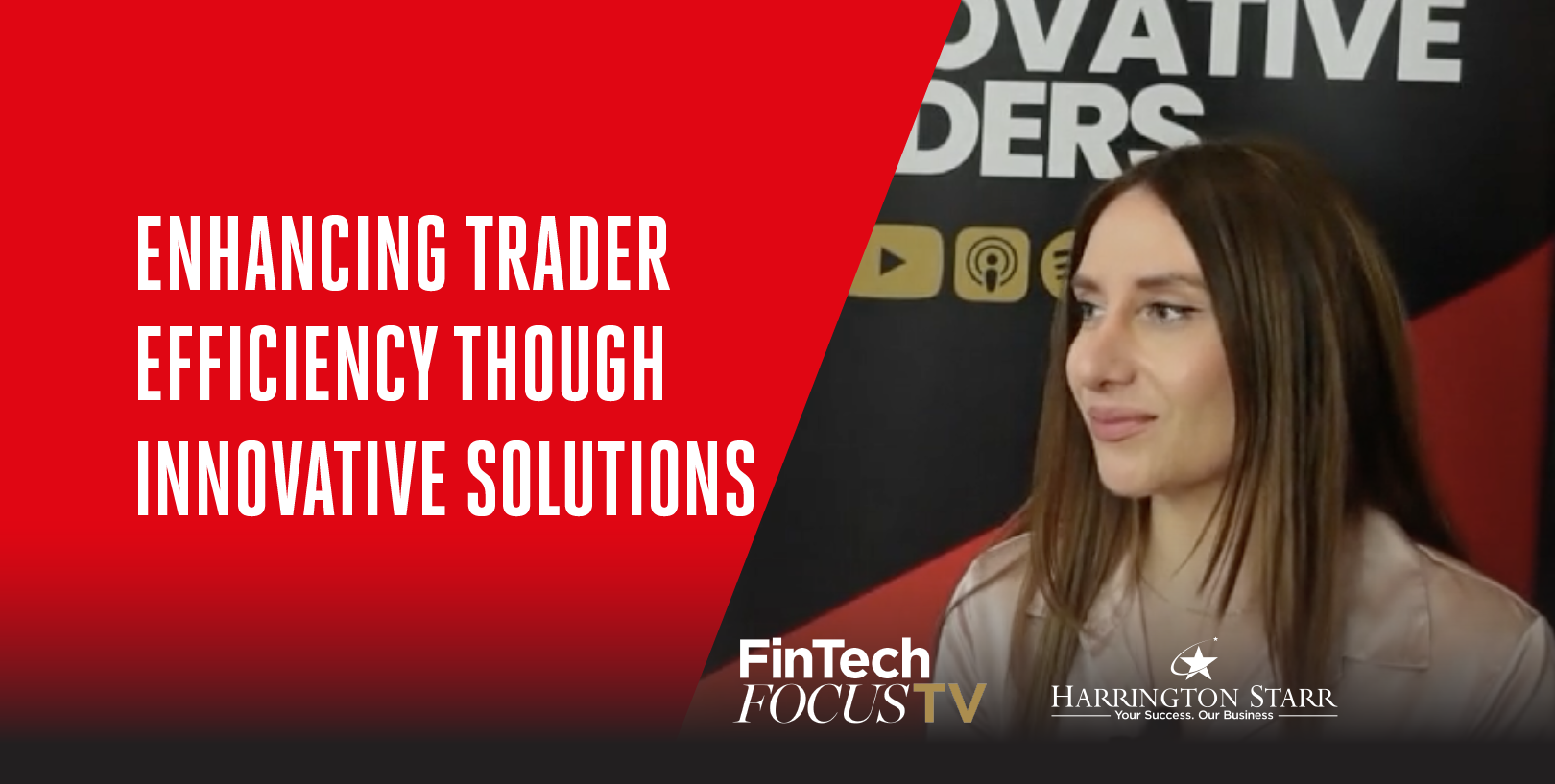
The AI Revolution in Trading
FinTech Focus TV, hosted by Toby Babb, delivers insightful discussions with industry leaders, uncovering the latest trends in financial technology. In this special episode, recorded live at TradingTech Summit 2025 in Canary Wharf, Toby sits down with Dina Dede, Principal Technical Program Manager at Microsoft, to discuss the impact of AI in financial services, the shift towards low-code solutions, and how businesses can stay ahead in an era of rapid technological change.
The Role of AI in Trading Technology
Kicking off the discussion, Dina shares her insights into how AI is reshaping the financial services industry. As a Principal Technical Program Manager at Microsoft, she works at the intersection of technology and business, ensuring innovative solutions align with industry needs. She explains that AI is no longer just a buzzword—it has become a critical tool for enhancing trader efficiency, optimising workflows, and improving decision-making in the financial markets.
Dina highlights that the rise of Generative AI (GenAI) is significantly altering how financial institutions operate. AI-driven solutions are being integrated into trading strategies, risk assessment models, and predictive analytics, enabling firms to react faster and more effectively to market movements. With AI’s ability to automate repetitive tasks, traders can focus on high-value decision-making, ultimately boosting productivity and improving market efficiency.
Why Now? The Catalyst for AI Adoption in Financial Services
Toby and Dina explore why AI adoption has accelerated so rapidly in recent years. Dina attributes this shift to technological advancements, cost reductions, and the growing need for speed and efficiency in financial services. AI-driven automation is becoming a necessity as firms seek to streamline their processes and enhance trading infrastructure.
Another key driver is the emergence of low-code and no-code platforms, which allow financial firms to develop and integrate AI solutions without requiring deep technical expertise. This democratisation of technology is making it easier for organisations to adopt AI and implement seamless automation into their existing workflows.
The Rise of AI in Trading and Financial Services
As AI continues to evolve, its applications within trading technology and financial services are expanding. Dina emphasises how AI-powered models are now being deployed across multiple sectors, including finance, healthcare, and manufacturing. In financial markets, AI is playing a crucial role in predictive analytics, algorithmic trading, and fraud detection.
AI models are helping traders analyse vast amounts of data in real time, uncovering patterns that would be impossible for humans to detect manually. This enhanced market intelligence is providing firms with a competitive edge, allowing them to make data-driven decisions faster and more accurately.
Challenges and Risks of AI Adoption in Finance
Despite the many benefits AI brings to financial services, its adoption comes with challenges. Toby and Dina discuss the regulatory complexities of implementing AI within a highly regulated industry like finance. Financial institutions must ensure that AI-driven solutions comply with strict regulatory frameworks while maintaining transparency and accountability.
Dina stresses the importance of responsible AI in financial services. AI models must be built on clean, diverse datasets to avoid bias and ensure accurate predictions. Additionally, firms must ensure that AI is not just an automation tool but a technology that adds value by enhancing risk management, compliance, and operational resilience.
One of the biggest concerns surrounding AI adoption is data integrity. Financial firms must ensure that the data used to train AI models is reliable, as skewed predictions in finance can lead to significant risks. AI’s decision-making processes must also be explainable, allowing firms to understand and validate the outcomes generated by these models.
The Future of AI in Financial Services
Looking ahead, Dina envisions a future where AI becomes a fully integrated partner in financial services rather than just a tool for automation. Over the next five years, she predicts that AI will be seamlessly embedded into trading platforms, risk management systems, and customer service solutions, creating a more efficient and intelligent financial ecosystem.
AI’s evolution will also bring new challenges, including ethical considerations and data security concerns. However, with the right strategies in place, financial institutions can leverage AI to drive innovation, efficiency, and market growth.
How FinTech Professionals Can Prepare for the AI-Driven Future
As AI continues to reshape the industry, professionals in finance must adapt to stay competitive. Dina advises individuals to stay informed, upskill, and embrace emerging technologies. She recommends following industry trends, engaging with thought leaders, and continuously learning about AI’s impact on financial services.
Developing both technical and business skills will be crucial for those looking to thrive in the AI-driven financial landscape. While understanding machine learning and AI fundamentals is beneficial, professionals should also focus on improving their communication and strategic thinking skills to bridge the gap between technology and business.
For those new to AI, there are countless resources available, from online courses and webinars to industry events and podcasts like FinTech Focus TV. Staying curious and proactive will be key to navigating the rapidly evolving FinTech landscape.
Microsoft’s Innovations in AI and Financial Services
Dina also shares some of Microsoft’s latest innovations in AI, including the company’s recent advancements in quantum computing and open-source collaborations. Microsoft is working closely with financial institutions to develop AI-driven solutions that enhance market analytics, optimise trading strategies, and improve regulatory compliance.
One of the major projects Dina is involved in is the collaboration between Microsoft and the London Stock Exchange Group (LSEG). This partnership aims to leverage AI and big data to enhance financial insights and improve trading efficiency. By integrating Microsoft’s technology with LSEG’s vast data resources, the collaboration is paving the way for more advanced financial modelling and predictive analytics.
The Power of Data and AI in Financial Markets
Data is at the core of AI’s success in financial services. Dina explains that the financial industry generates an enormous volume of data every day, from market trends and trading activity to risk assessments and customer behaviour. Harnessing this data effectively is critical to driving AI-powered decision-making and financial innovation.
With AI’s ability to process and analyse data at scale, financial firms can gain deeper insights into market movements, customer preferences, and trading strategies. However, ensuring data quality and integrity remains a top priority, as flawed or biased data can lead to inaccurate predictions and increased financial risks.
Embracing AI for a More Innovative Financial Tech Future
As the conversation comes to a close, Dina leaves listeners with an important message: embrace AI, stay informed, and remain adaptable. The future of financial services will be shaped by those who are willing to innovate, collaborate, and continuously learn. AI is not something to fear but a transformative force that can drive growth, efficiency, and competitive advantage in financial markets.
This episode of FinTech Focus TV, featuring Dina Dede, Principal Technical Program Manager at Microsoft, offers crucial insights that directly relate to Harrington Starr’s role as a leading FinTech recruitment company. As AI continues to revolutionise trading technology and financial services, businesses need to stay ahead by hiring the right talent who can drive innovation, implement AI-driven strategies, and navigate the challenges of an evolving digital landscape.
Dina’s discussion on AI’s growing impact on trader efficiency, predictive analytics, and regulatory compliance underscores the increasing demand for specialist talent in FinTech. As firms adopt low-code solutions, AI-powered risk management, and automated workflows, the need for professionals with AI expertise, software engineering skills, and deep financial knowledge has never been higher. At Harrington Starr, we are at the forefront of this change, helping businesses find the talent needed to bridge the gap between technology and finance.
Moreover, the conversation about the ethical use of AI, regulatory considerations, and the need for data integrity in financial services aligns with Harrington Starr’s expertise in sourcing top talent for compliance, cybersecurity, and risk management roles. As AI adoption accelerates, firms must ensure they have the right people in place to develop responsible AI frameworks, manage large-scale data strategies, and ensure seamless FinTech integrations.
This episode highlights the future of AI in finance and reinforces why businesses must invest in hiring top-tier professionals to navigate these shifts. Harrington Starr continues to connect leading FinTech firms with the best talent, ensuring companies stay ahead in an AI-driven financial world
Toby and Dina’s discussion 2025 highlights the immense potential AI holds for the financial industry. From enhancing trader efficiency and automating workflows to driving predictive analytics and improving regulatory compliance, AI is set to revolutionise how financial institutions operate.
For professionals looking to stay ahead, now is the time to invest in learning, develop new skills, and explore the opportunities AI presents. With Harrington Starr at the forefront of FinTech recruitment, we understand the skills and expertise needed to thrive in this evolving landscape. Whether you’re a technology specialist, a financial analyst, or a business leader, staying ahead of AI trends will be crucial for future success.





